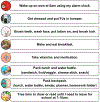Evidence-Based Interventions in Autism
- PMID: 38423716
- PMCID: PMC11788931
- DOI: 10.1016/j.pcl.2024.01.001
Evidence-Based Interventions in Autism
Abstract
Pediatricians have a critically important role in the care of children with autism, including conducting developmental screening to support early diagnosis and intervention, advising families about evidence-based treatments for autism spectrum disorder, and supporting families' emotional health as they care for a child with a developmental disability. The purpose of this article is to provide pediatricians with information about evidence-based autism treatments and how to determine which interventions are appropriate for children across the autism spectrum at different ages and developmental stages.
Keywords: Autism spectrum disorder; Behavior intervention; Early intervention; Evidence-based practice.
Copyright © 2024 Elsevier Inc. All rights reserved.
Conflict of interest statement
Disclosure None of the authors has any commercial or financial conflicts of interest. Funding sources for all authors. 1) Eunice Kennedy Shriver National Institute of Child Health and Human Development (NICHD): K23HD094855. Surviving and Thriving in the Real World: A Daily Living Skills Intervention for Adolescents with Autism Spectrum Disorder (PI: Amie Duncan), 2) Autism Speaks which supports the Autism Care Netowrk (ACNet) and ECHO Autism at Cincinnati Children's Hospital (PI: Julia Anixt). J.S. Anixt: Autism Speaks: ECHO Autism at Cincinnati Children’s Hospital for Primary Care and Allied Health Professionals. Autism Speaks: Improvement Advisor, Autism Care Network (ACNet). Autism Speaks: Cincinnati Children’s Hospital Autism Learning Health Network Leadership Site / Autism Care Network (ACNet). NIH: R33 HD100934 (NICHD) Evaluating Assessment and Medication Treatment of ADHD in Children with Down Syndrome (TEAM-DS) (PI: Anna Esbensen, PhD, Tanya Froehlich, MD; my role-co-investigator)HRSA Maternal & Child Health Developmental-Behavioral Pediatrics training Program Award, T7749098 (PI: Tanya Froehlich, MD; my role- faculty member). J. Ehrhardt: N/A. A. Duncan: Eunice Kennedy Shriver National Institute of Child Health and Human Development (NICHD): K23HD094855. Surviving and Thriving in the Real World: A Daily Living Skills Intervention for Adolescents with Autism Spectrum Disorder (PI: Duncan).
Figures
References
-
- Lipkin PH, Macias MM, COUNCIL ON CHILDREN WITH DISABILITIES, SECTION ON DEVELOPMENTAL AND BEHAVIORAL PEDIATRICS. Council on children with disabilities section on developmental behavioral pediatrics. promoting optimal development: identifying infants and young children with developmental disorders through developmental surveillance and screening. Pediatrics 2020; 145(1):e20193449. - PubMed
-
- National Autism Center. Findings and conclusions: National standards project, phase 2. MA: Author Randolph; 2015.
-
- Steinbrenner JR, Hume K, Odom SL, et al. Evidence-based practices for children, youth, and young adults with Autism, 2020, The University of North Carolina at Chapel Hill, Frank Porter Graham Child Development Institute, National Clearinghouse on Autism Evidence and Practice Review Team, Chapel Hill; NC.
-
- The Roadmap Project. roadmapforemotionalhealth.org Accessed 03/31/2023.


